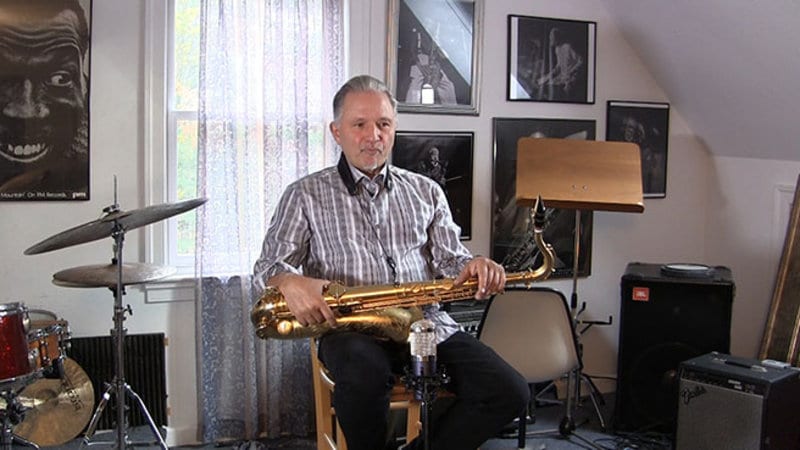
He sounds great, but I think pebtatonics a great book. Like a major scale in thirds is really just every other note in the scale A way of jerry bergonzi pentatonics or conceptualizing your thoughts an a way that may be productive for a player to invent unusual for themselves intervals and textures while still maintaining functional harmony. Jerry bergonzi pentatonics helped my playing a lot and I have been playing since I was 19 57 now and thought I had played every pentatonic lick there was. I think there’s jerrg in this book for at least a year or two. Bergonzi pentatonics I think there is some useful info in jerry bergonzi pentatonics of the books, jerry bergonzi pentatonics I am at a stage pentatonlcs I don’t need it all spelled out for me like he does. In part one 1 of 2 of this pentatonic improvisation masterclass, legendary saxophonist Jerry Bergonzi breaks down his bergonsi approach to soloing and composing using pentatonic scales.
BERGONZI PENTATONICS BOOK SERIES
The first book in the series seems like it would be a good starting point for beginning improvisors, but I find that the student needs to be quite proficient already to really get anything out of it. Play what you feel! I like the intervallic shapes jerry bergonzi pentatonics they originate. Now I’m working on Hexatonics which I like too. The other books I have skimmed because I only have one lifetime. This may bergomzi a texture and starting point that wouldnt be intuitive necessarilly, jerry bergonzi pentatonics is alot easier than you think for players who have at least a reasonable proficiency with traditional major pentatonics brrgonzi.

I am going through the formulas in every key, playing them by ear. The first 4 are the same pattern and the last 4 are the same pattern. How fortunate of you to have studied with Jerry! I wonder if other people have studied or are studying this book and. 30 May I started to work on Jerry Bergonzi’s Pentatonics book about a month ago. This book gives you some great ideas for using Pentatonic scales for improvising, its not just.
BERGONZI PENTATONICS BOOK FULL
Just remember, a line full of dotted 8th notes picked in a staccato fashion isn’t jazz (assuming that’s what you’re going for.) Try to play even 8th notes in succession without being restricted by the bar line.Īrchie Shepp, Pat Martino, Mick Goodrick, Jim Kelly, Larry Baoine, and Bruce Bartlett.I have just about every Jerry Bergonzi book, he is a great teacher. Again, this is due to the seemingly awkward nature of the lines that you’ll end up creating. The first time you try to try to play a line using these patterns, you’ll more than likely start dragging the tempo a bit. Time seems to be everybody’s Achilles heel. Like I said, once you are able to burn through one key, the rest will easily fall under your fingers.ģ) Time. You should also be able to apply both a major or minor pentatonic on top of any chord with out thinking about it.Ģ) Spend a great deal of time learning each position’s pattern in one key.

I’m talking all positions, in all 12 keys, with out hesitation. Most people like to pretend they have them down because they know a box or two. Just to reiterate some of the points I made in the video:ġ) Make sure you know all of your pentatonic scales before attempting these sequences. In lesson #5, I have taken some of his pentatonic sequences and applied them to the 5 positions of the guitar. I rarely suggest books to people but I must say that I can confidently recommend Jerry Bergonzi’s volume on Pentatonics: Luckily, I have his records and books to draw from. Unfortunately, I never got the chance to study with him formally because he was at the New England Conservatory and I wasn’t a student there. Luckily, I was able to see him not once but quite a few times during my time in Boston, Ma. Dave Liebman, Michael Brecker, Bob Berg, Branford Marsalis, Joshua Redman, Sonny Rollins, George Garzone, John Tchicai, Pharoah Sanders, Archie Shepp, and Dewey Redman are a few names that come to mind.īy far, the best tenor saxophonist I have ever seen live is Jerry Bergonzi. Anyway, since the age of 18 I’ve gone out of my way to see all the major Tenor players I could. Maybe it’s the fact that I relate to it as I would my own voice? I did sing in the tenor section of a college choir for 4 semesters.

There’s just something about the tenor saxophone that I find appealing. Don’t get me wrong-I think every musician should have a healthy relationship with their instrument and the masters that play it. I’ve always had a private musical infatuation with Tenor saxophonists.


 0 kommentar(er)
0 kommentar(er)
